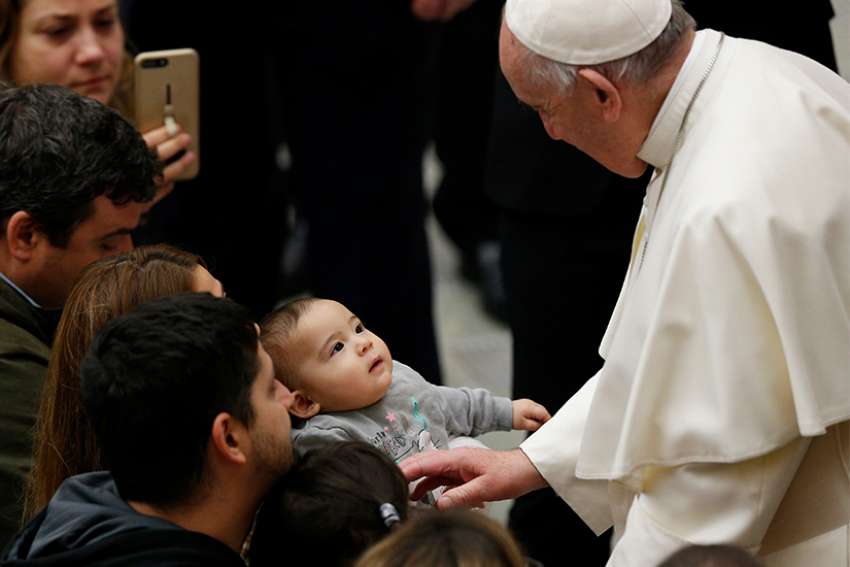While the fundamental issues of abortion and euthanasia are vitally important, Pope Francis has proposed an agenda that also incorporates issues ranging from ecology to bio-technology to economics and migration.
The expanded agenda has left pro-life campaigner Matthew Wojciechowski confused.
“I feel extremely weird criticizing a pope,” said Wojciechowski, vice-president of Campaign Life Coalition.
The sweeping new mandate was outlined in a letter titled Humana Communitas sent by Pope Francis to the Pontifical Academy for Life. Published Jan. 15, the letter lays out a philosophical and religious basis for work on life issues.
The Pope proposes that life issues must extend beyond abortion and euthanasia to encompass such issues as the death penalty, the fate of migrants and a consumerist mentality that prizes individual comfort and security over relationships and the common good.
“It is time for a new vision aimed at promoting a humanism of fraternity and solidarity between individuals and peoples,” Pope Francis wrote.
The letter follows up on new statutes for the Vatican’s pro-life academy issued in 2016. The Pontifical Academy for Life was founded in 1994 by St. John Paul II
“It’s disturbing in the sense that there seems to be a complete make-over, a shift in the core values of the Pontifical Academy for Life,” Wojciechowski said.
The Pope’s letter encourages that Christian humanism — which teaches that scientific knowledge and technology is to be used to serve humanity and glorify God — should be applied to the scientific, economic and ecological issues of the day in order to advance the welfare of society.
“We cannot continue down the mistaken path followed in recent decades of allowing humanism to be deconstructed and considered simply as another ideology of the will to power,” Pope Francis writes. “We must resist such ideologies.”
Francis criticizes narrowly focused, political activism. In place of a culture-war agenda, he recommends the priorities that were outlined in his 2015 encyclical Laudato Si’.
“It is one thing to resign oneself to seeing life as a battle against constant foes, but something entirely different to see our human family as a sign of the abundant life of God the Father and the promise of a common destiny redeemed by the infinite love that even now sustains it in being,” he wrote.
Wojciechowski said that, despite the Pope’s plea, the pro-life movement is not going “to change everything we do.”
“We (will) keep doing what we do, which is to change hearts and minds here in Canada,” he said.
He rejects the idea Campaign Life represents a narrowly ideological, partisan movement now at odds with the Pope’s priorities.
“I don’t think pro-lifers have a home in politics in Canada. None of the parties — whether it’s the left or the right, the Conservatives or the Liberals — none of them want us,” he said. “Sometimes even the Church doesn’t want us.”
Tim Lau, president of the Canadian Federation of Catholic Physicians’ Societies, worries that the Pope’s emphasis on dialogue with those who disagree with Church teaching may go nowhere.
“The wider focus as an ideal is encouraging, but it takes two to tango,” he said in an email.
But Lau regrets the results of a polarized abortion debate in Canada.
“Sadly, we have no law in Canada at this point limiting abortion for any reason, at any time — neither in the criminal code or anywhere else,” he said. “It was all or nothing. We have nothing, and nothing to show for it, except our principles and our perception that we did not cave.”
Canadian Catholic Bioethics Institute executive director Moira McQueen welcomes the Pope’s philosophical embrace of Christian humanism and anthropology.
“It is a very definitive shift,” she said. “Of course, coming from Pope Francis, it makes sense to me that he would be saying words like we need to be more contemporary in terms of how we look at things and maybe the more contemporary issues. I think that’s absolutely right.”
The Pope is not downplaying the difficult issues of abortion and euthanasia, only connecting them to a broader understanding of what it means to be human, she said.
“The areas of abortion and euthanasia, they seem to have divided us politically as much as morally,” she said. “They’re huge moral issues. I give them their due importance. But do they shape entirely the way we are in today’s world? I don’t think so.”
McQueen is one of the theologians who advises the Congregation for the Doctrine of the Faith on the International Theological Commission. She points out how the Pope’s thinking on life issues builds on the agenda of Pope Benedict XVI.
Humana Communitas “reminds us that we still have much work to do,” said Catholic Organization for Life and Family executive director Michel MacDonald.
“There’s a technological logic that can sort of reduce our moral vision,” MacDonald said.
MacDonald is encouraged by the Pope’s emphasis on the beauty and joy of life as a starting point for thinking and talking about life issues.
“He talks about the via pulchritudinis,” he said. “I think part of our mission is to help people see the beauty of life… We’re called through our lives to build up a culture of life and help families and others to live in God’s good creation, right? There’s a real deep creation theology there. The Gospel way of life really is something beautiful, something attractive, something that is life-giving, right?”
But Wojciechowski remains uneasy.
“The Pontifical Academy for Life has a vision that was very clearly designed and it’s been like that for 25 years,” he said. “If this academy loses its original purpose and vision, then what’s left?
“Will the Holy See, will Rome, still have a group of dedicated people who will specifically be responsible for this issue? I don’t know. That’s the problem.”

